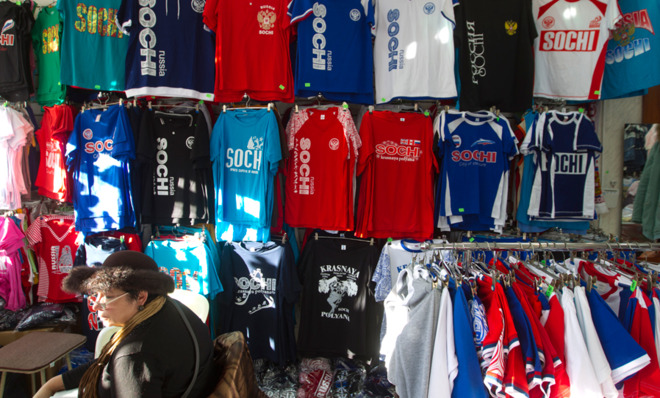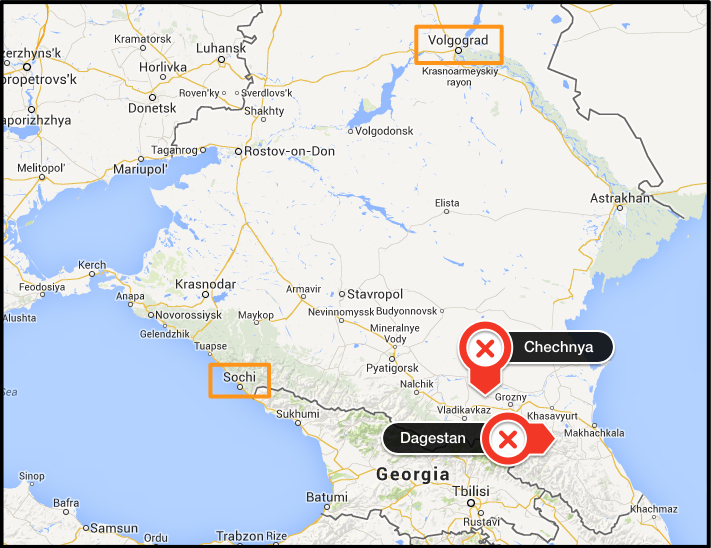Why the Volgograd bombings won't ruin Russia's Sochi Olympics
In fact, it may help Vladimir Putin pull off a Winter Games close to his own heart


A free daily email with the biggest news stories of the day – and the best features from TheWeek.com
You are now subscribed
Your newsletter sign-up was successful
In the span of 24 hours at least 31 people were killed and dozens more wounded in two suicide bombing attacks in Volgograd, Russia. Along with the death toll, two other numbers are getting a lot of attention regarding the bombings: Six and 400. It is just six short weeks until the start of the Winter Olympics in Sochi, about 400 miles southwest of Volgograd.
So far nobody has claimed responsibility for the attacks, and there's no proof that they are related to the Sochi Games. Russian security officials blame Muslim separatists from the North Caucusus region, probably Dagestan, for the attacks. Moscow and other Russian cities have been attacked periodically by Chechen and Dagestani suicide bombers for more than a decade.

Still, in July, Chechen separatist leader Doku Umarov put out a video threatening to use "maximum force" to disrupt the "satanic" Sochi Olympics. "They plan to hold the Olympics on the bones of our ancestors, on the bones of many, many dead Muslims, buried on the territory of our land on the Black Sea," he added, referring to a mid-1800s battle.
The Week
Escape your echo chamber. Get the facts behind the news, plus analysis from multiple perspectives.

Sign up for The Week's Free Newsletters
From our morning news briefing to a weekly Good News Newsletter, get the best of The Week delivered directly to your inbox.
From our morning news briefing to a weekly Good News Newsletter, get the best of The Week delivered directly to your inbox.
International sporting events have been the focus of attacks before, including the Olympics, from Eric Rudolph's bomb in Atlanta in 1996 to the murder of 11 Israeli athletes and one German police officer by a Palestinian group during the 1972 Games in Munich. This year's Boston Marathon bombing was a grisly reminder that sporting events make for "soft" targets with a large built-in global audience.
"Is this the beginning of a larger terrorist campaign leading up to Sochi?" asks ABC News. "There should be little doubt it is."
Steven Lee Myers at The New York Times adds, "Never before has an Olympic host country experienced terrorist violence on this scale soon before the Games. Current and former American law enforcement and intelligence officials said Sunday that they were more concerned about security in Russia during the Sochi Games than they have been about any other Olympics since Athens in 2004."
But it's worth remembering that the Athens Games were an attack-free success, as were the 2012 Summer Olympics in London — a metropolitan area much harder to protect than Sochi. Russian President Vladimir Putin has ordered increased security in Volgograd, a city of one million formerly called Stalingrad, and elsewhere in Russia. But Russian Olympic Committee head Alexander Zhukov said Monday that "no additional security measures will be taken in Sochi."
A free daily email with the biggest news stories of the day – and the best features from TheWeek.com
It's hard to imagine how Russia could lock down Sochi any further. Starting Jan. 7, only officially registered vehicles will be given access to Sochi and only visitors with special passes will be allowed into the region. Russia has spent months sweeping neighborhoods and targeting potential attackers in the North Caucusus and across the border in Georgia.
"Sochi will be turned into a veritable fortress," says Leonid Bershidsky at Bloomberg View. Putin will deploy all the resources of Russia's formidable intelligence and counterterrorism apparatus to make sure Sochi goes off without a hitch. And Bershidsky adds, "Law enforcement chiefs know Putin won't forgive them for allowing anyone to mess with an Olympic showcase that has cost $48 billion to stage."
International Olympic Committee President Thomas Bach is also making soothing statements, saying he had personally written Putin "to express our condolences to the Russian people and our confidence in the Russian authorities to deliver safe and secure Games in Sochi." Describing terrorism as "a global disease" that must "never be allowed to triumph," Bach added, "I am certain that everything will be done to ensure the security of the athletes and all the participants of the Olympic Games."
Sochi and the people who travel there for the Games may be safe — or as safe as humanly possible. Still, if extremists continue to bomb train stations and other public transportation in Russia, enough people could decide to skip the Olympics to mar the Sochi Games with half-empty stadiums. Perhaps even a few countries will sit out this Winter Olympics.
But here's how the Volgograd bombings may actually help Putin: So far the Western coverage of the Games has been mixed with protests over Russia's anti-gay laws. President Obama is pointedly sending over a delegation with two openly gay athletes, for example. Russia is already calling for international solidarity, and if the focus of the Games shifts to thwarting terrorism, history tells us that terrorism threats trump just about every other issue. After all, fighting Islamist terrorists is one of the few things Putin's Russia and Obama's America have in common.
Peter has worked as a news and culture writer and editor at The Week since the site's launch in 2008. He covers politics, world affairs, religion and cultural currents. His journalism career began as a copy editor at a financial newswire and has included editorial positions at The New York Times Magazine, Facts on File, and Oregon State University.
-
 How the FCC’s ‘equal time’ rule works
How the FCC’s ‘equal time’ rule worksIn the Spotlight The law is at the heart of the Colbert-CBS conflict
-
 What is the endgame in the DHS shutdown?
What is the endgame in the DHS shutdown?Today’s Big Question Democrats want to rein in ICE’s immigration crackdown
-
 ‘Poor time management isn’t just an inconvenience’
‘Poor time management isn’t just an inconvenience’Instant Opinion Opinion, comment and editorials of the day
